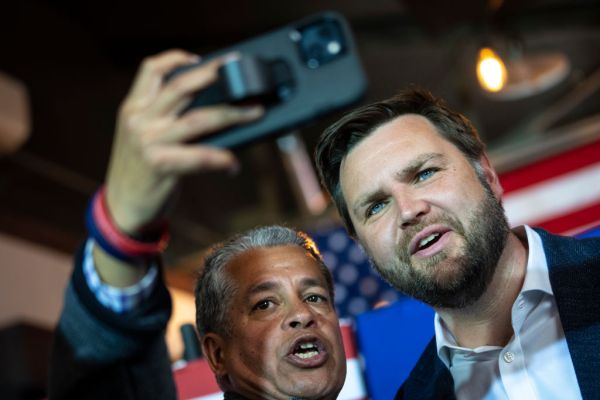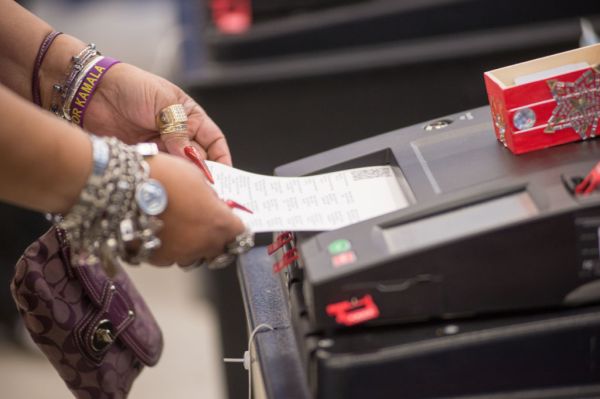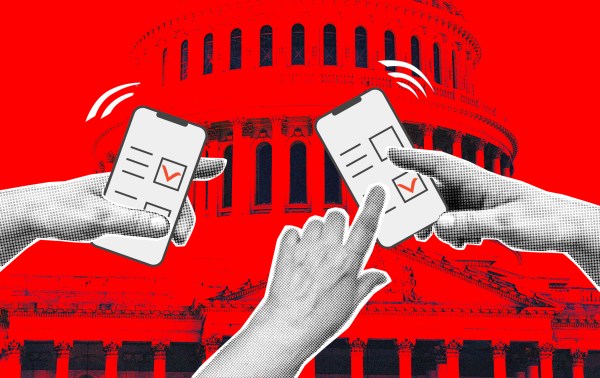Happy Thursday! We were yesterday years old when we learned that there’s apparently a name for people who crowd around the gate at an airport, sometimes in an attempt to board before their allotted time: “gate lice.” So, uh, don’t be a gate louse, folks.
Quick Hits: Today’s Top Stories
- Dr. Johanna Olson-Kennedy—the lead researcher on a key National Institutes of Health-funded study on the use of puberty-blocker treatment in children—told the New York Times in an interview published Wednesday that she’s delayed publishing data from the study, which started nine years ago. Olson-Kennedy has long been an advocate for youth gender treatments, but she said the results of the study did not show an improvement in the mental health of the children who received puberty blockers. “I do not want our work to be weaponized,” she said. “It has to be exactly on point, clear and concise. And that takes time.”
- Secretary of Defense Lloyd Austin confirmed on Wednesday that “there is evidence” of North Korean troops in Russia. “What exactly they’re doing, well, that’s to be seen,” Austin told reporters in Rome. After a briefing from their intelligence agency, South Korean lawmakers said Tuesday that North Korea had sent 3,000 troops to Russia with plans to deploy a total of 10,000 soldiers. White House National Security Council spokesman John Kirby said Wednesday that U.S. assessments also indicated 3,000 North Korean troops were being trained in Russia. He warned that if the troops were deployed to Ukraine, then they would become “fair game and fair targets” for the Ukrainian military.
- Terrorists on Wednesday attacked a state-run defense company, Turkish Aerospace Industries, in Ankara, Turkey, killing five people and wounding at least 22 others. The attackers were armed with rifles and bombs, setting off explosions at the facility. Local authorities said that two of the terrorists were killed by authorities responding to the incident. No terrorist group has yet taken responsibility for the attack.
- Ukraine’s prosecutor general, Andriy Kostin, resigned on Tuesday, taking responsibility for a draft dodging and corruption scandal allegedly involving dozens of prosecutors fraudulently securing disability waivers to protect themselves from military service. Kostin’s resignation followed Ukrainian outlets reporting on the scheme last week and a subsequent internal investigation. “Many shameful facts of abuse have been established within the system of the prosecutor’s offices of Ukraine,” Kostin said in a statement. Ukraine’s intelligence service revealed Tuesday it has been investigating dozens of officials suspected of issuing fraudulent disability certificates. Nine officials have been tried and found guilty, and more than 4,000 certificates were deemed to be fraudulent.
- The Group of Seven (G7)—a collection of advanced democracies—announced on Wednesday a $50 billion loan to Ukraine that will be paid back over time with the interest generated by $260 billion in frozen Russian assets held in the West. The U.S. will provide $20 billion of the package—half as economic aid and half as additional military aid. The military aid portion of the loan will need congressional approval, and the Biden administration said Wednesday it will provide the full amount as economic aid if Congress does not authorize the disbursement. The European Union and other G7 countries will disburse the remaining $30 billion.
- Hezbollah confirmed Wednesday that Hashem Safieddine—the cousin of Hassan Nasrallah, the group’s leader eliminated by Israel last month—had been killed in an Israeli airstrike earlier this month. Safieddine served as the leader of the terrorist group’s executive council and was the presumed successor to Nasrallah. The confirmation followed Israeli officials announcing his death on Tuesday night.
Will Election Fraud Claims Fuel Violence?

Earlier this week, the Department of Justice indicted a Philadelphia man who threatened to kill a state party official who was recruiting poll watchers to observe the activities at voting stations on Election Day.
The man texted the state party official expressing interest in helping out, but then things got dark. “I will KILL YOU IF YOU DON’T ANSWER ME!” the man allegedly texted the official. Then, “Your days are numbered, B—!” Ultimately, he apparently made a threat to the party official’s life so graphic we won’t repeat it here.
Political violence is already very much a part of this election cycle after two attempts on the life of the Republican candidate for president. But concerns about election-related violence seem far from over with under two weeks to go until a nail-biter election and the memory of the violence at the Capitol on January 6, 2021, looming over the proceedings.
Twice in two months this summer, someone tried to kill former President Donald Trump. In July in Pennsylvania, a 20-year-old with idiosyncratic political beliefs and who seemed to have been acting alone, fired at Trump from the roof of a building near a campaign rally, injuring the former president and two attendees and killing a man in the crowd. In September, a man camped out for hours at the perimeter of Trump’s West Palm Beach golf course allegedly waiting to shoot the former president. A Secret Service agent spotted him and fired at the man, who fled and was later arrested. Law enforcement later discovered he had promised $150,000 to anyone who could “finish the job.” Now, the former president delivers outdoor speeches from behind a wall of bulletproof glass and won’t hit the links again until after the election.
But it’s not just Trump who’s been the target of political violence. Reuters reported this week that there have been 300 instances of political violence since the January 6 attack on the Capitol almost four years ago, when hundreds of people–egged on by the former president’s bogus claims of fraud in the 2020 election—tried to delay by force the congressional certification of President Joe Biden’s victory.
This year alone, there have been at least 50 instances of political violence. In Tempe, Arizona, police this week arrested a suspect who they say was behind repeated shootings at a Democratic National Committee campaign office, though no one was injured in any of the incidents. He was charged with several felonies, including a terrorism charge. In Michigan in July, a man in an ATV ran over an elderly man who was putting up a Trump sign in his yard in an attack that police described as politically motivated. According to Reuters, instances of political violence rose beginning in 2016 but have leveled off in the years since.
In addition to the one-off acts of political violence, organized domestic terrorism—premeditated, and meant to have a broader psychological effect—with partisan motivations is also on the rise. Analysis from the Center for Strategic and International Studies (CSIS), a nonpartisan think tank, of 30 years of domestic terrorism data showed that plots on government targets motivated by partisan political beliefs have increased dramatically in the last five years, to triple the number of plots compared to the previous 25 years combined. “In the 1990s, the anti-government terrorist movement was really spearheaded by the American militias,” Riley McCabe—program manager and research associate for the warfare, irregular threats, and terrorism program at CSIS—told TMD. “Those were groups organized in opposition generally to government authority.”
That’s changed in the last eight years. “What we’re seeing today is the attacks against government targets are increasingly against political party officials, political candidates, elected officials, and political workers and their staff,” said McCabe, who worked on the analysis. And among the factors driving that change are conspiracy theories—particularly election denialism—and extreme partisan political beliefs. “That just looks very different from what we saw in anti-government domestic terrorists in the decades preceding the past eight years or so, where they used to be focused on federal authority, and now it’s really focused on the other side of the aisle,” he told TMD.
There could be more ahead. The FBI and Department of Homeland Security (DHS) issued a notice to state and local officials earlier this month warning that “domestic violent extremists” could be motivated by “election-related grievances” to commit violence. Wired reported last week that DHS documents are warning government agencies that “perceptions of voter fraud” are among the most significant triggers for election-related violence.
And Trump allies—as well as the former president himself—are already laying the groundwork for fraud claims as early voting has gotten underway. As we reported earlier this month, the former president and Republicans in Congress are increasingly raising the alarm over the prospect of noncitizens voting in federal elections—though the evidence of that happening in past elections is vanishingly small, even as it’s also extremely unlikely to affect the outcome of any election. Just last week, Trump surrogate and billionaire Elon Musk claimed that “they’re importing voters.”
Dominion Voting Systems, a maker of voting machines and tabulators, is once again at the center of voter fraud conspiracies—despite the flurry of successful defamation lawsuits the company brought in the aftermath of the bogus claims made about the machines during the 2020 election cycle. Musk—who is, not for nothing, the richest man in the world—fairly explicitly linked the use of Dominion machines to Republican losses in Pennsylvania and Arizona. “There’s always a sort of question of like, say, the Dominion voting machines,” he said at his town hall event in suburban Philadelphia on Friday. “It is weird that the, you know, I think they’re used in Philadelphia and in Maricopa County, but not in a lot of other places.”
His social media site, X, is already awash with even less subtle accusations of fraud by Dominion, and Rep. Marjorie Taylor Greene of Georgia claimed last week that Dominion machines were “flipping” people’s votes—all based on an anecdote of one woman in Georgia accidentally selecting the wrong candidate on the machine, legally spoiling that ballot, and starting again.
Predictably, with the voting process under the microscope, election workers have become particular targets of threats and violence, especially after the 2020 election. In September, packages containing a suspicious powder were sent to election officials in six states, though there weren’t reports of hazardous material inside—unlike last November when someone sent letters to election offices in five states that were laced with traces of fentanyl. According to a May survey by the Brennan Center for Justice, a progressive think tank, nearly 40 percent of the local election officials it surveyed reported experiencing threats, harassment, or abuse.
As of April, the Justice Department’s Election Threats Task Force has reportedly received more than 2,000 referrals to investigate threats against election workers since it launched in June 2021. Of those, the unit had opened just 100 cases as it tries to sort through which of the intimidating messages to election workers constitute “true threats,” rendering them speech that is not protected by the First Amendment. The task force says that as of this month, it’s pressed charges in just 20 cases.
But the call isn’t just coming from inside the house: Members of the U.S. intelligence community warned this week that foreign adversaries like China, Iran, and Russia are trying at minimum to sow chaos and distrust around the election and are likely also hoping to incite violence. As we reported this month, Iran has even plotted to assassinate Trump. “The [intelligence community] is increasingly confident that Russian actors are considering—and in some cases implementing—a broad range of influence efforts timed with the election,” intelligence officials warned Tuesday in a bulletin. “Some of these are aimed at inciting violence and calling into question the validity of democracy as a political system, regardless of who wins.”
“Others,” the note continued, “are aimed at amplifying false information and conspiracies—that may exacerbate post-election tensions in the United States.” Among the bogus stories Russia apparently invented and then boosted—with help from right-wing influencers—is a baseless claim that Gov. Tim Walz, the Democratic vice presidential nominee, sexually assaulted a former student.
Given the heightened threat environment, election workers have been preparing. Many of the buildings where election officials work have taken measures including installing new metal detectors, hiring armed security, and purchasing bulletproof vests, in addition to other security upgrades in jurisdictions across the country. And in Maricopa County, Arizona, a primary target for election conspiracy theories, snipers will be posted on the roofs of tabulation centers where staff and volunteers count Americans’ votes.
Worth Your Time
- CNN’s Clarissa Ward has reported from some of the world’s most harrowing hot spots—from Kabul after the return of the Taliban to Kharkiv during the opening of Russia’s invasion of Ukraine. In her latest dispatch, she recounted her experience being held captive by the general of a militia in Darfur, Sudan. “We were held under armed guard by the general, the security chief and roughly a dozen soldiers, some who looked no older than 14. Our detention was spent out in the open, underneath acacia trees,” she wrote. “As the only woman, and with no private space to relieve myself, I limited my water and food intake. Sleep, when it came, was a mercy, a reprieve from the clawing sense of panic at not knowing when I would be able to see my children again. As a journalist, one never wants to become the story. And yet our experience is instructive in understanding the complexities of the conflict in Darfur and the challenges of getting food and aid to those who need it most and getting the story out to the world.”
Presented Without Comment
The Telegraph: Trump Makes Legal Complaint Over [U.K.] Labour’s ‘Blatant Foreign Interference’ In U.S. Election
In a release announcing the complaint, the Trump campaign accused Labour of being a “far-Left” party that had “inspired Kamala’s dangerously liberal policies and rhetoric.”
Susie Wiles, Trump’s campaign manager, said: “In two weeks, Americans will once again reject the oppression of big government that we rejected in 1776.”
Also Presented Without Comment
CNN’s Anderson Cooper, moderating a town hall with Vice President Kamala Harris:
Cooper: Do you think Donald Trump is a fascist?
Harris: Yes I do, yes I do.
In the Zeitgeist
FX released a trailer for the TV adaptation of Patrick Radden Keefe’s best-selling true crime book on the Troubles in Northern Ireland. And to make sure we Americans can understand the Irish accents, they embedded captions in the trailer.
Toeing the Company Line
- In the newsletters: The Dispatch Politics crew covered the Harris campaign’s efforts to drum up support among young men, and Scott argued that industrial policy has an uncertainty problem.
- On the podcasts: Jonah is joined by Kenneth Pollack, senior fellow at the American Enterprise Institute, on The Remnant to discuss the tenuous state of affairs in the Middle East, and Sarah and David examine the legality of Elon Musk’s million-dollar “raffle” on Advisory Opinions.
- On the site: Michael reports on Appalachia’s recovery from Hurricane Helene, experts weigh in on what’s next for immigration policy under Trump or Harris, and Charlotte covers last-ditch efforts to reach a ceasefire deal in Gaza before the election.
Let Us Know
Are you concerned about political and election-related violence? Do you plan to volunteer on Election Day or tabulate votes—and if so, are you concerned about your safety?











Please note that we at The Dispatch hold ourselves, our work, and our commenters to a higher standard than other places on the internet. We welcome comments that foster genuine debate or discussion—including comments critical of us or our work—but responses that include ad hominem attacks on fellow Dispatch members or are intended to stoke fear and anger may be moderated.
With your membership, you only have the ability to comment on The Morning Dispatch articles. Consider upgrading to join the conversation everywhere.